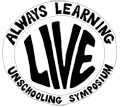At the upcoming Always Learning Live Unschooling Symposium (ALL) in December, I'm going to be talking about what made me think unschooling was a good idea back umpteen years ago when we started. I've been thinking about that a lot, lately. I thought SO much more in terms of "education" back then, that my reasons all had to do with how the kids would learn math or science or history or reading and writing in natural ways that wouldn't destroy their love of learning. It is really interesting to me, now, that those are NOT the main reasons I think unschooling is wonderful. They seem pretty trivial in comparison to the really big important things in life that have so much more to do with character and behavior. I'll talk about them, but I no longer have any concern about whether or not unschooled kids will learn to read or write or do math or whether they'll have "gaps" in their education. I guess I'll talk about why that seems like a complete nonissue to me, these days.I'm also going to talk about what I have learned about unschooling. I've learned a lot about it in just in the past week, so this talk is definitely a work in progress. What I have in mind is talking about some of the things I did not know about unschooling until we'd done it. The one thing I've been thinking about this week is that unschooling is a profoundly optimistic decision and that it involves a huge commitment to living a very optimistic life. I'm going to talk more about what I mean by that and what happens when children grow up that way - kind of amazing.
I'm also thinking a lot about the damage done by schooling - thinking of this in contrast to the above. Schooling is a quite pessimistic endeavor. It assumes negative behaviors are normal, expects the worst, and sets up system with a zillion rules and consequences for breaking the rules. It assumes kids don't want to learn and have to be bribed or punished to get the learning into them. What effect does living in such a pessimistic environment have on kids?
Scientists who study this stuff report that pessimism and optimism seem to be slightly inherited - maybe due to being connected to other factors that are genetic. But they are also largely learned habits of attitude. I think it is possible that THE most significant thing unschooling does is nurture optimism.
-pam
Thursday, November 1, 2012
More on Pam's presentation
Pam Sorooshian posted this to Always Learning a week and a half ago. I thought I should put it here, too, as a preview. I'm looking forward to her presentation.
Subscribe to:
Comments (Atom)
